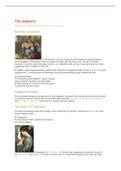The seasons
Summer and winterSeasonal renewalThe myth of Proserpina
Summer and winter
In The Winter's Tale, the sunshine that infuses the sheep-shearing
scene suggests the idealistic nature of ‘pastoral' poetry. But the play is not only set in summer
sunshine. In the first half of the play (in Act II, sc i) Mamillius tells us that ‘a sad tale's best for winter',
suggesting that it is winter at that time.
In addition, when Paulina berates Leontes after Hermione's apparent death (in Act III, sc ii), her words
suggest that sin and the death of innocence may be symbolised by winter's death-like cold:
‘A thousand knees,
Ten thousand years together, naked, fasting,
Upon a barren mountain, and still winter
In storm perpetual, could not move the gods
To look that way thou wert.'
Seasonal renewal
The movement between the seasons not only suggests renewal of the natural world, but also reminds
us that time moves on during the course of the play (see also: Natural and unnatural development,
and Contrasts and divisions) allowing for Leontes' spiritual renewal.
The myth of Proserpina
The idea that seasons eternally change is also reinforced by Perdita's reference (in IV. iv.) to a well-
known classical myth:
O Proserpina,
For the flowers which, frighted, thou let fall
From Dis's wagon!
Prosperpina (or Persephone in Greek) was supposedly seized by the god of
the underworld, Dis (or Pluto). He took her down into his underworld kingdom, but could not have





